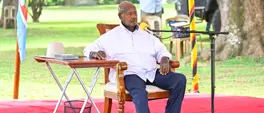JAMIL F. KHAN | Without gender liberation, true freedom cannot exist
Jamil F. Khan
29 September 2025 | 11:48"But the truth is clear: without gender liberation, no freedom exists. As long as women endure such egregious human rights violations, a safe and prosperous world will remain impossible."

Picture: Pixabay.com
In 2021, a major offensive led by the Taliban overthrew the government of Afghanistan, installing them as the ruling authority across the country’s 421 districts. The Taliban had previously ruled Afghanistan from 1996 to 2001, when they were already notorious for authoritarian policies, particularly violent in their oppression of women.
This point was one of the justifications used by the US-led invasion in 2001, framed as a mission to liberate the people of Afghanistan and install democracy. However, this time, the Taliban’s misogynistic policies seem to signal a vengeful agenda - aimed at satisfying an even more heightened lust for power and control over women, as if carefully plotted during their 20-year wait to return to power.
Often referenced in American society as a yardstick for gender transformation, Afghanistan has long been invoked in the rallying cry, “this is not Afghanistan,” by those defending women’s rights. Yet those very rights are also under great threat in the USA, where an increasingly authoritarian government appears committed to institutionalising the oppression of women.
According to a UN News report, recent Taliban policies now control nearly every aspect of women’s existence. These include denying access to education, healthcare, employment, and social spaces. Women have been banned from speaking, singing, and laughing in public, as well as from appearing on balconies or even looking through windows.
Those without a male chaperone, or not completely covered, effectively live under state-sanctioned house arrest. The repression is so granular that simply being a girl or woman appears criminalised, erased entirely from public life. These restrictions not only exist alongside near-total freedoms for men but actively enable them. For example, in 2022, women working in the Ministry of Finance were ordered to send male relatives to take their jobs.
In August, a 6.6 magnitude earthquake struck Eastern Afghanistan, claiming more than 2,000 lives and injuring over 3,000 people. With regulations ordering women to remain indoors, it was clear the disaster would disproportionately affect women. Already invisible and erased, their plight worsened during rescue operations.
The Taliban’s rigid ideology of gender separation, which prohibits contact between unrelated men and women, meant many male rescuers refused to touch women trapped under rubble, leaving them to suffer or die in obedience to their rulers.
Patriarchy and its compulsory misogyny have also shaped my own socialisation, imparted actively and passively through word and deed. Long before I understood my own relationship to gender, my environment taught me that the feminine was inferior, and that it was essential to guard the line separating the “inferior feminine” from the “superior masculine.”
Few, if any, can claim to have escaped patriarchal conditioning without dishonesty. Despite global claims to value equality, patriarchal ways of thinking and being remain deeply entrenched, legitimised through culture, politics, and social life. Even where gender reforms exist, they often settle for bare minimums, while high rates of gender-based violence persist and are routinely ignored.
In South Africa, rape and femicide characterise gender relations. In the USA, women’s rights to safe abortion and bodily autonomy have been rolled back.
In France, the legal definition of rape only recently included consent. In Palestine, Sudan, and the Democratic Republic of Congo, rape is deployed as a tool of war and genocide.
Across peaceful democracies and authoritarian regimes alike, one constant remains: the systemic oppression of women. Nation-states, imagined as naturally led by men, rely on this oppression for their stability, whether subtle or severe. Even in societies with more equal gender relations, forms of everyday discourse continue to suggest women’s inferiority.
The consequences of misogyny are deadly. Too often, this truth is dismissed as metaphorical, creating the illusion that its harm is not literal or widespread. Violence against women is frequently imagined as isolated attacks by strangers, when in reality it begins as ideology. These ideologies, insisting on the inferiority and disposability of women, become laws and policies that criminalise women’s very existence, while erasing femininity more broadly, including its expression by queer people.
A UN Women fact sheet on women in Afghanistanhighlights the devastating results. Women are living shorter, less healthy lives. Maternal mortality rates are rising, exacerbated by high rates of adolescent births due to child marriage. Most women cannot even make decisions about their own health; these are often left to male relatives.
Confinement to the home has also triggered a mental health crisis, with women and girls reporting extreme levels of anxiety, hopelessness, and despair. Limited access to physical activity, community, and emotional support deepens the suffering. Like women worldwide, Afghan women also put their own health last, prioritising children and families amid worsening economic hardship.
The knock-on effects of gender oppression, rooted in ideology and belief, pose a threat to all societies, fuelling illness, inequality, and social decline. Yet we continue to tolerate these conditions, so long as they do not directly affect us.
While Afghanistan is often held up as the global extreme of gender oppression, it also distracts from the fact thatoppression persists everywhere, only in different forms. These comparisons risk normalising oppression elsewhere as “not so bad.”
But the truth is clear: without gender liberation, no freedom exists. As long as women endure such egregious human rights violations, a safe and prosperous world will remain impossible.
Jamil F. Khan is an award-winning author, doctoral critical diversity scholar, and research fellow at the Johannesburg Institute for Advanced Study.













